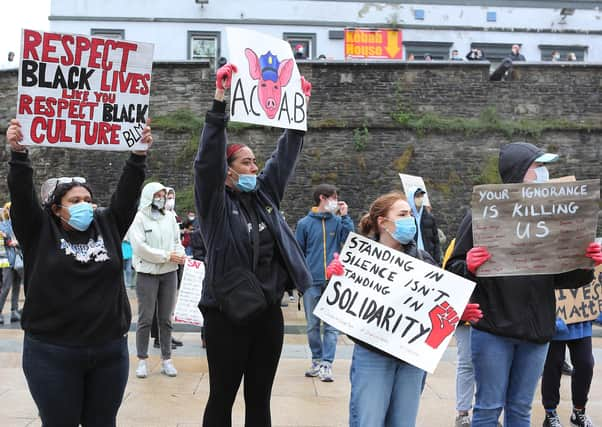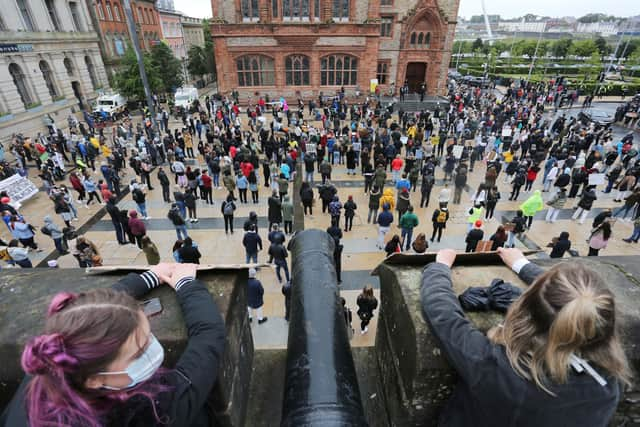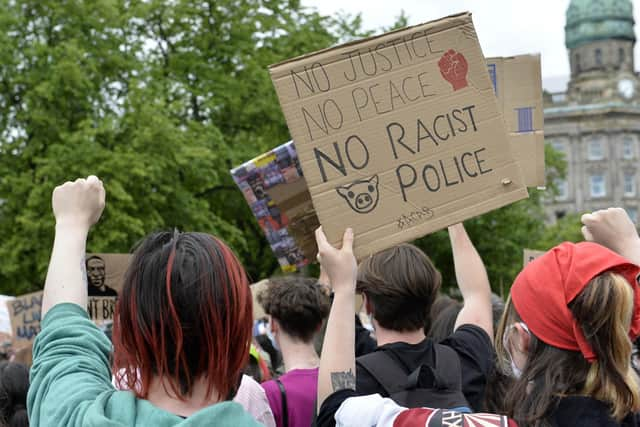PSNI heavily criticised for actions at Black Lives Matter protests


The protests, which took place in central Belfast and Londonderry on June 6, saw 71 fines handed out to people deemed to be in breach of coronavirus restrictions (57 in Londonderry, 14 in Belfast).
The orginisers had decided to stage the events in the wake of an earlier BLM rally in Belfast on June 3, which police estimated drew around 2,000 people – although the PSNI decided not to take any action over that event.
Advertisement
Hide AdAdvertisement
Hide AdIn the days leading up to June 6, the force – alongside Arlene Foster, Michelle O’Neill, Naomi Long and Robin Swann – sought to dissuade protestors from repeating the June 3 gatherings.


Organisers pressed ahead regardless, stressing they would ask people to social distance.
At the time, gatherings of more than six people (except from the same household) were prohibited.
Movement was also restricted without reasonable excuse.
Police were empowered to order people to disperse, and if they did not, police had the power to remove them.


Advertisement
Hide AdAdvertisement
Hide AdThe police had no power to enforce social distancing at the events.
The ombudsman subsequently received “concerns” about the consistency of approaches in Belfast and Londonderry on June 6.
Such concerns intensified following a demonstration under the banner of “Protect Our Monuments” at Belfast City Hall on June 13 (a gathering largely seen as a reaction to BLM demands to tear down statues of historic figures).
It was said by BLM supporters that the “Protect Our Monuments” demo was policed in a far more hands-off fashion than either of the BLM protests, with no fines handed out.
Advertisement
Hide AdAdvertisement
Hide AdThe ombudsman’s report said that at the Londonderry BLM protest on June 6, the police had issued three public announcements to demonstrators that they would hand out fines to them, but that the protestors did not disperse.
The report also found police there had been “courteous” and that some had been captured on video “expressing support and understanding for the principles underpinning the protest”.
Protestors there numbered between 500 and 1,200.
In Belfast on the same day, officers had been briefed that the “threshold for arrest was high” and were told that the BLM protestors were not to be arrested for failure to provide personal details.
The ombudsman described officers’ demeanour as “friendly and courteous” (at one point four officers even backed off from arresting a suspect who had become “aggressive” after a crowd assembled around the man, who then applauded as the officers retreated).
Two tannoy warning were made, but the crowd stayed.
Around 1,000 people were at the Belfast protest.
Advertisement
Hide AdAdvertisement
Hide AdAt the “Protoect Our Monuments” demonstration in Belfast on June 13, there were abut 300 people by police estimate (by that stage, gatherings of up to 10 people were permitted, rather than six).
The ombudsman found that “there was no evidence of imminent enforcement action” at the June 13 rally, “in contrast” with the BLM ones.
She said police seemed to have been “learning” from the June 6 demos “that enforcement was not an effective means of achieving crowd dispersal at large gatherings”.
THE OMBUDSMAN’S CONCLUSIONS:
> The ombudsman’s conclusions make reference to the UN Convention on Human Rights (to which the UK is signatory), saying that when it came to the BLM protests, “PSNI failed to demonstrate regard to Article 10 (freedom of expression) and Article 11 (right to protest and right to peaceful assembly and association)”.
Advertisement
Hide AdAdvertisement
Hide Ad> They also “failed to have regard to the approach of other UK Police Forces and to the organisers’ proposals for safe protests and social distancing”.
> The ombudsman also found that the “PSNI did not exploit opportunities to constructively engage with the Black, Asian and Minority Ethnic Communities involved with ‘Black Lives Matter’ protests... this exposed an historic gap in strategic relationships with these communities”.
She said the PSNI also “failed to have regard to the following matters...
> “The international and domestic context of ‘Black Lives Matter’. Namely, the public response to police use of lethal force against George Floyd and other members of the black community in the USA and wider concerns of racial inequality”
Advertisement
Hide AdAdvertisement
Hide Ad> “Constructive engagement with the Black, Asian and Minority Ethnic Communities prior to the protests on 6th June.
> “The diverse nature of those who were likely to attend the ‘Black Lives Matter’ protests on 6th June 2020.”
> She said that the fact police had warned the organiser of the Londonderry protest that they were at risk of prosecution under the coronavirus laws “further inhibited the opportunity for engagement with these communities”.
> Perhaps the key element of her findings is this:
The police’s actions “gave rise to claims of unfairness and discrimination... these concerns are in my view cogent, have substance and are justified”.
Advertisement
Hide AdAdvertisement
Hide AdHowever she adds: “I believe that this unfairness was not intentional... Rather PSNI failed to balance Human Rights with the public health considerations and requirements of the Regulations.
“Confidence in policing of some within the Black, Asian and Minority Ethnic Communities of Northern Ireland has been severely damaged by the PSNI’s policing of the ‘Black Lives Matter’ protests.”
PSNI RESPONDS TO REPORT:
The ombudsman notes that the PSNI’s believed the coronavirus laws “and public health considerations... took primacy over the protesters’ rights under Article 10 and 11”.
Reacting to the report, the PSNI issued this statement from Chief Constable Simon Byrne: “The report from the Police Ombudsman provides an important commentary about pressures arising from the policing operation on two days in June this year in unique and novel circumstances, using policing powers derived from
emergency public health Regulations.
Advertisement
Hide AdAdvertisement
Hide Ad“From the outset, both personally and as an organisation, we were alive to the widespread revulsion at the events that led to the death of George Floyd in the USA.
“We tried our best to respect the public health requirements of the Northern Ireland Executive to save lives and at the same time deal with public outcry triggered by this awful death.
“We operated within the legal framework available to us at the time, but the Ombudsman is clear that whilst unintentional, we got that balance procedurally
wrong.
“As is only prudent and as the Ombudsman herself says in her comprehensive report, we will now seek to embrace the lessons learned and carefully consider her
Advertisement
Hide AdAdvertisement
Hide Adspecific recommendations about policy, practice and procedural fairness.
“Our first step has already been to announce our new Community Relations Taskforce to help us do just that.
“We will provide more details about this early next year.
“We will have to review this report in concert with the earlier report from the Policing Board and I will report our next steps further in January.
“However, it is clear to me that some members of the Black and Minority Ethnic Community have been frustrated, angry and upset by our policing response and our relationship with them has suffered.
Advertisement
Hide AdAdvertisement
Hide Ad“For that I am sorry, and I am determined in that regard to put things right.”
Further coverage:
Click here: ‘Thousands of Northern Irish people were murdered and their crimes are unsolved – their lives matter too’
Click here: Black Co Down clergyman: Having a grievance is no excuse for endangering people with mass protests
Advertisement
Hide AdAdvertisement
Hide AdClick here: SDLP figures shy away from backing party colleague’s demand for PSNI to be condemned over George Floyd rally
A message from the Editor:
Thank you for reading this story on our website. While I have your attention, I also have an important request to make of you.
Advertisement
Hide AdAdvertisement
Hide AdWith the coronavirus lockdown having a major impact on many of our advertisers — and consequently the revenue we receive — we are more reliant than ever on you taking out a digital subscription.
Subscribe to newsletter.co.uk and enjoy unlimited access to the best Northern Ireland and UK news and information online and on our app. With a digital subscription, you can read more than 5 articles, see fewer ads, enjoy faster load times, and get access to exclusive newsletters and content.
Visit https://www.newsletter.co.uk/subscriptions now to sign up.
Our journalism costs money and we rely on advertising, print and digital revenues to help to support them. By supporting us, we are able to support you in providing trusted, fact-checked content for this website.
Alistair Bushe
Editor